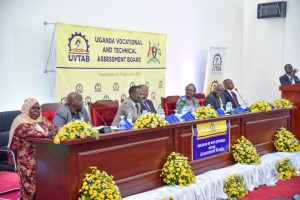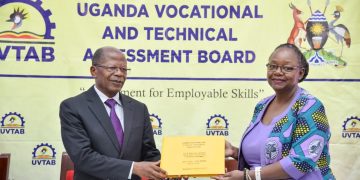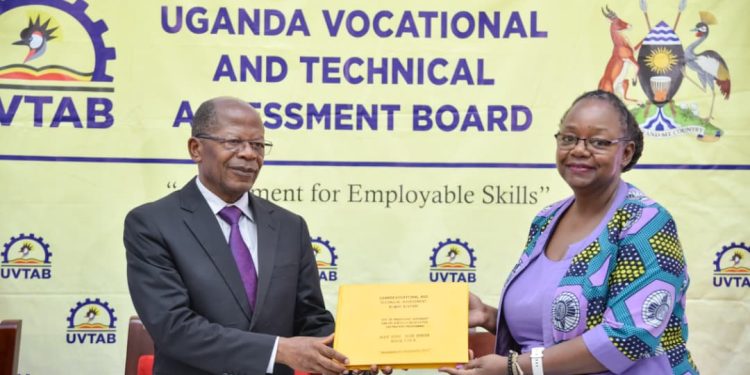The Uganda Vocational and Technical Assessment Board (UVTAB), has released the May/June 2025 end of Programme assessment series with 91% of the students acquiring full competences.
According to Onesmus Oyesigye, UVTAB Executive Secretary, the Board registered a total of 30,291 candidates, with female candidates contributing 17,245 (57%) compared to male candidates who were 13,046 (43%).
“Out of the total 30,291 candidates that registered, 26,610 (88%) turned up for assessments. Out of those that sat, 24,116 (91%) successfully acquired full competences,” said Oyesigye.
Of the 30,291 candidates that registered, 3,681 (12%) were absent in one or more paper assessments, while 26,610 (88%) of registered candidates turned up for end of programme assessments.
The informally trained candidates contributed a total of 19,511 (64%) while candidates registered for formal training assessments were 10,78 (36%).
Candidates that registered for Technology Education and Training were 14,475 (48%), Agriculture Education and Training; 2,449 (8%), Business Education and Training; 4,439 (15%) and Home Science Education and Training with 8,928 (29%).
The assessments were conducted from May 2 to June 27, 2025 in 499 assessment centres. Out of the 499 centres, 306 (61%) presented candidates for formal TVET programmes and 193 (39%) presented those from the informally acquired skills.
It is observed that the completion rate for candidates across most programmes was very good, above 75%.
Oyesigye noted that the general performance of female candidates was better with 14,188 (92%) out of 15,399 candidates that sat acquiring full competence compared to males, where out of 11,211 candidates that sat, 9,928 (89%) successfully acquired full competences.
“The completion rates of the candidates from the informally acquired skills were good at 96% compared to those from formal TVET at 81%,”
He added, “The good performance may be attributed to the flexible nature of acquiring skills and focused hands-on skilling that the trainees go through.”
Releasing the exams, The Minister of State for Higher Education, John Crhysostom Muyingo, revealed that the TVET reforms have taken off with the existing TVET system and agencies created including the TVET Council and the Assessment Boards.
He noted that these entities will play a key role in the realization of the TVET reforms guided by the regulatory arm, delivery, and assessment in line with the TVET Act 2025 that commenced on March 15, this year.
“To this end, it is imperative that we strengthen our partnerships with professional bodies, industry associations, and TVET providers worldwide.”
He explained the alignment is essential for producing employable artisans, technicians, technologists and other professionals that can contribute to the industrialization agenda.









